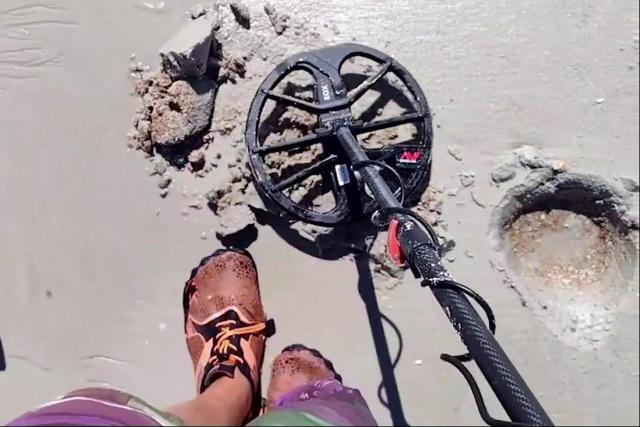Unearthing hidden treasures, discovering lost artifacts, and embarking on exciting adventures – that’s the thrill of metal detecting in Florida! With its rich history dating back centuries, the Sunshine State holds countless secrets just waiting to be uncovered. But before you grab your trusty detector and set off on your quest for buried treasure, it’s crucial to understand Florida’s metal detecting laws.
Metal Detecting Laws in Florida
In Florida, metal detecting is generally allowed on public beaches, but be sure to check local ordinances as some municipalities may have restrictions. Digging holes near lifeguard towers or in heavily trafficked areas is typically prohibited.
However, metal detecting is prohibited in most state parks in Florida, with exceptions for coastal parks where it’s allowed between the high water mark and the toe of the dune. Park managers can further restrict or ban the activity on specific beaches, so it’s best to contact the park manager beforehand to confirm the rules.
The Archeological Resources Preservation Act (ARPA) governs metal detecting in Florida, meaning certain historical areas and protected lands are off-limits to preserve their integrity. These sites hold significant historical value and must be protected for future generations.
It’s important to note that any historical artifacts found on public or private land in Florida belong to the state. Valuable historical or archaeological finds must be reported to the proper authorities, usually the Division of Historical Resources.
If you want to metal detect on private property in Florida, you’ll need to obtain explicit permission from the property owner. Always be respectful and courteous when seeking written permission.
While metal detecting in Florida, you must use a hand tool for digging, and keep holes no deeper than 6 inches, filling them immediately after. Cutting vegetation for metal detecting purposes is strictly prohibited. Always report valuable historical or archaeological finds to the proper authorities.
Some of the most famous beaches to go for metal detecting in Florida are:
| Beach | Details |
|---|---|
| Sebastian Inlet State Park | Renowned for its shipwreck history, particularly from the 1715 Spanish Fleet disaster. Search for coins, jewelry, musket balls, and even anchors amidst golden sands. |
| Treasure Coast Beaches (Vero Beach, Wabasso Beach, Fort Pierce Beach) | Spanning multiple areas, this stretch of coastline offers a treasure trove of potential finds. “Coins on the sand” phenomenon after storms in Wabasso Beach, Spanish silver reales in Vero Beach, and Civil War relics near Fort Pierce Beach await discovery. |
| Siesta Key Beach | Famed for its powdery white sand and crystal-clear waters, Siesta Key also holds hidden treasures. Lost jewelry, coins, and even pirate booty have been unearthed amongst the pristine landscape. |
| Daytona Beach | This iconic destination isn’t just for racing! Metal detecting near the pier or historic boardwalk can yield lost rings, trinkets, and souvenirs from decades of vacationers. |
| Cocoa Beach | Home to the Kennedy Space Center, Cocoa Beach isn’t your typical treasure hunting spot. However, lost space program mementos, vintage souvenirs, and even Civil War relics can be found near the pier or historic sites. |
How to Apply for a Metal Detecting Permit in Florida?
While most metal detecting in Florida doesn’t require a permit, there are certain instances where one might be necessary.
Metal detecting on public beaches, private property (with the property owner’s permission), and surface detecting in state parks generally does not require a permit.
However, if you plan to conduct research or excavate artifacts on public or private land, you’ll need a permit from the Division of Historical Resources. Additionally, certain activities like using motorized equipment or detecting in restricted areas might require permits from the Bureau of Land Management (BLM).
For research permits or access to underwater preserves, contact the Division of Historical Resources. Also, check with the specific BLM office managing the land you plan to visit for any additional permit requirements.
Is Metal Detecting illegal on Florida Beaches?
As of 2024, metal detecting in Florida is completely legal, but with several crucial conditions and restrictions.
Here are some of the places in Florida where metal detecting is generally legal:
- Public beaches: Generally allowed, but check local ordinances for specific rules.
- Coastal state parks: Allowed between the high water mark and the toe of the dune, unless explicitly prohibited by park management.
- Private property: Only with the owner’s permission.
Final Thoughts
Overall, Florida is a fantastic location for your metal detecting adventures. The state’s nature, history, weather, and liberal legislation make this pastime enjoyable. Before heading out, familiarize yourself with Florida’s metal detecting laws. If you’re planning to detect on private property, always acquire permission from the owner to avoid trespassing charges.



